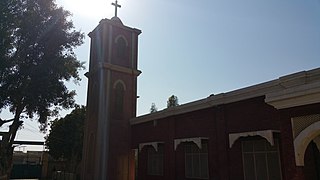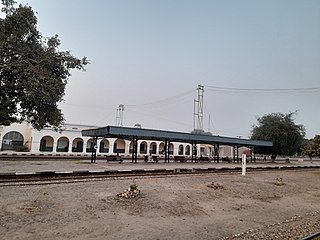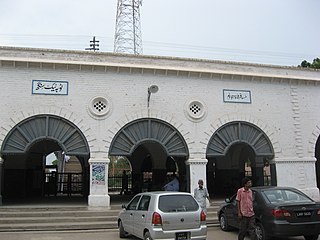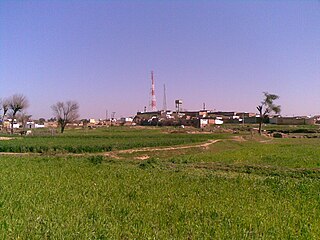
Rawalpindi is a city in the Punjab province of Pakistan. It is the fourth most populous city in Pakistan after Karachi, Lahore, and Faisalabad, and third most populous in Punjab after Lahore and Faisalabad. Rawalpindi is situated close to Pakistan's capital Islamabad, and the two are jointly known as the "twin cities" because of the social and economic links between them.

Toba Tek Singh District is a district of Faisalabad Division in the Punjab province of Pakistan. It is located between 30°33' to 31°2' Degree north latitudes and 72°08' to 72°48' Degree longitudes. It became a separate district in 1982.

Kartar Singh Duggal was an Indian writer who wrote in Punjabi, Urdu, Hindi, and English. His works include short stories, novels, dramas and plays. His works have been translated into Indian and foreign languages. He has served as director of the All India Radio.

Chichawatni is a city in the Sahiwal District of the Punjab province of Pakistan. It is the administrative center of Chichawatni Tehsil. Situated near the old main road called Grand Trunk Road, it lies approximately 45 kilometres (28 mi) from the district capital, Sahiwal. In 2011, Chichawatni's population was estimated at approximately 160,000.

Toba Tek Singh is a city and capital of Toba Tek Singh District in the Pakistani province of Punjab. It is surrounded by cities of Gojra, Kamalia, Rajana, Pir Mahal and Shorkot.

Sialkot District, is one of the districts of the Punjab province of Pakistan. It is located in the Majha region of Panjab, otherwise the northeast of the province. The city of Sialkot is the capital of the district. The Sialkot Cantonment was established in 1852.

Sikhism in Pakistan has an extensive heritage and history, although Sikhs form a small community in Pakistan today. Most Sikhs live in the province of Punjab, a part of the larger Punjab region where the religion originated in the Middle Ages, with some also residing in Peshawar in the Khyber-Pakhtunkhwa province. Nankana Sahib, the birthplace of Guru Nanak, the founder of Sikhism, is located in Pakistan's Punjab province. Moreover, the place where Guru Nanak Dev died, the Gurudwara Kartarpur Sahib is also located in the same province.

Doaba also known as Bist Doab or the Jalandhar Doab, is the region of Punjab, India that lies between the Beas River and the Sutlej River. People of this region are given the demonym "Doabia". The dialect of Punjabi spoken in Doaba is called "Doabi". The term "Doaba" or "Doab" is derived from Persian دو آب meaning "land of two rivers". The river Sutlej separates Doaba from the Malwa region to its south and the river Beas separates Doaba from the Majha region to its north.
Shahkot is a small city and one of the five tehsils of Jalandhar district in Punjab, India. Shahkot is situated on Jalandhar-Moga-Barnala-Sirsa National Highway 703. Shahkot is administered by the Municipal Committee. About 176 villages belong to Shahkot tehsil. Shahkot was famous for its red chili peppers; but now, its main crops are Wheat, Paddy, Maize, potato, etc. Agricultural land is not suitable for paddy. But with the use of pesticides and tubewell water; paddy is grown.

Sardar Hukam Singh was an Indian politician and the third Speaker of the Lok Sabha and second Deputy Speaker of the Lok Sabha from 1962 to 1967. He was also governor of Rajasthan from 1967 to 1972.

Giani Gurmukh Singh Musafir was an Indian politician and Punjabi language writer. He was the Chief Minister of Punjab from 1 November 1966 to 8 March 1967.
A jathedar is a leader of high regard chosen to head and ensure discipline within a jatha, a body of Sikhs.
Thoha Khalsa is a village in Kahuta Tehsil, Rawalpindi District in Punjab Province of Pakistan.

Fateh Singh was an Indian Sikh religious and political leader, and a key figure in the Punjabi Suba movement. He was revered as Sant Fateh Singh among his followers.

The Khalsa Akhbar, Lahore, was a weekly newspaper and the organ of the Lahore Khalsa Diwan, a Sikh society. Published from Lahore in the Punjabi language, the newspaper was established in 1886 and functioned sporadically till 1905. Founded by Bhai Gurmukh Singh, a professor of Punjabi at the Oriental College, Lahore, who also established the Khalsa Press in Lahore, the paper was taken over by Giani Ditt Singh, a scholar and a poet.
Satyapal Dang (1920–2013) was an Indian independence activist, writer and later-day politician from Punjab. He was a legislator of Punjab State Legislative Assembly, representing the Communist Party of India for four terms and a Minister of Food and Civil Supplies in the United Front ministry led by Justice Gurnam Singh. He was also involved in trade union movement in India, aligning with the All India Trade Union Congress (AITUC). The Government of India awarded him the third highest civilian honour of the Padma Bhushan, in 1998, for his contributions to society.
Captain Rattan Singh was a freedom fighter and Punjabi politician who was the Member of Punjab Legislative Assembly (1962-1977) and also served as Minister of State for Agriculture and Animal Husbandry in Ram Kishan and Giani Gurmukh Singh Musafir's cabinet and Minister of Rural Development in Zail Singh cabinet.












